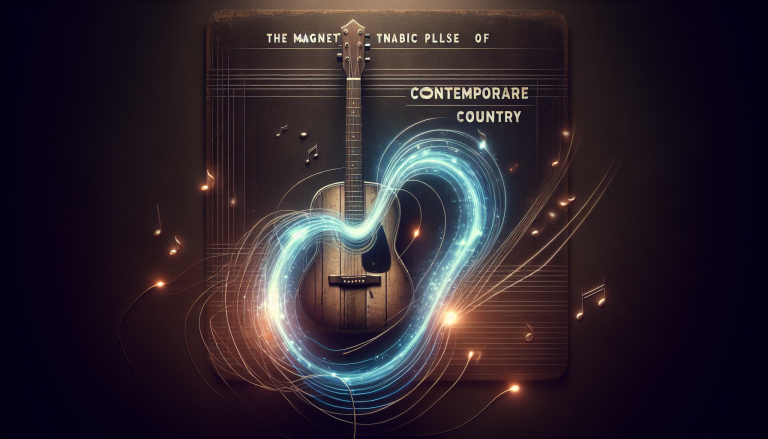The Roots and Rise of Contemporary Country
There is a magnetic current that flows through contemporary country music—a vibrant pulse that both honors the soulful roots of American music and embraces fresh, boundary-pushing sounds. Emerging in the late 20th century and blossoming into the definitive style of today’s airwaves, contemporary country is a genre where heartfelt storytelling dances gracefully with modern production and wide-ranging influences. It’s a genre that feels like a warm embrace from a close friend, yet also sparks an electrifying energy that invites you to dance, reflect, and connect.
To truly appreciate contemporary country, we must first journey back to where American music first planted its deep roots. This genre is a descendent of traditional country styles like honky-tonk, western swing, and bluegrass—styles birthed from the Appalachian Mountains and the Southern states, where the struggles and triumphs of everyday life found their purest expression in plaintive fiddles, twangy guitars, and voices laden with sincerity. Over the decades, country music became a soundtrack for American life, telling stories of heartache on dusty back roads, the thrill of new love, and the unfaltering spirit of home.
The Heart and Sound of Contemporary Country
Contemporary country music is more than a mere continuation—it is a beautiful evolution. It preserves the storytelling cornerstone that has defined country since its inception, but it also blends that tradition with pop sensibilities, rock rhythms, and sometimes even a hint of hip-hop’s swagger. The melodies are catchy yet honest, the lyrics intimate yet universal, and the production crisp yet steeped in authenticity.

This genre has expanded beyond the classic fiddles and steel guitars to integrate electric guitars, drums, and keyboards, creating a soundscape that appeals to both die-hard traditionalists and new generations of listeners. Yet, at its core, contemporary country remains anchored in vivid narratives—songs that speak of hopes, heartache, small-town pride, complex relationships, and the timeless pull of belonging.
Trailblazers and Today’s Stars
In understanding contemporary country, one cannot overlook the icons who have shaped and continue to define its spirit. Garth Brooks, with his raw energy and arena-filling presence in the 1990s, helped catapult country onto a national stage beyond its regional confines. Brooks brought a rock-like dynamism to country music, while still singing songs that resonated with heartland values and personal authenticity.
Alongside him, artists like Shania Twain revolutionized the genre, bringing a country-pop crossover appeal that broke sales records and won fans worldwide. Twain’s sparkle and unapologetic expression of femininity in her music created a new template for pop-infused country with hits like “Man! I Feel Like a Woman!” and “You’re Still the One,” both epitomizing the genre’s ability to balance fun and heartfelt emotion.
Modern stars such as Carrie Underwood, Luke Bryan, and Kacey Musgraves have each added their own brushstrokes to the genre’s colorful canvas. Underwood’s powerful voice and honest storytelling have won her a legions of devotees, as songs like “Before He Cheats” spin tales of empowerment wrapped in every note. Luke Bryan brings a spirited, party-ready vibe, reflecting rural life’s joys, while Musgraves offers a refreshing, introspective take with poetic lyrics and a gentle, sometimes irreverent, musical style.
Defining Albums and Unforgettable Songs
Several albums stand as milestones in contemporary country music, each marking a step forward in the genre’s rich narrative. Garth Brooks’ self-titled album released in 1989 introduced a bold new energy. Shania Twain’s “Come On Over” remains one of the best-selling albums of all time and is a blueprint of country-pop crossover success filled with timeless tracks.
Carrie Underwood’s “Some Hearts” brought the voice of a new generation into the spotlight with songs that mixed heartfelt ballads and powerful anthems. Kacey Musgraves’ “Golden Hour” offered a lush, genre-bending soundscape that earned critical acclaim and broadened country music’s horizons.
Among unforgettable songs, “The Dance” by Garth Brooks stands out as a poignant reflection on love and loss, its emotional depth reaffirming country music’s storytelling roots. Twain’s “That Don’t Impress Me Much” injected fun and sass into the genre. More recently, Musgraves’ “Follow Your Arrow” has been celebrated for its progressive lyrics and gentle challenge to country music norms, signalling the genre’s inclusive future.
Lasting Impact and Cultural Resonance
Contemporary country music’s lasting effect is its remarkable ability to balance evolution with tradition, appealing to the sentimental heart of American music while boldly incorporating new influences. It’s a genre that speaks to the soul of everyday life—its joys, trials, and complexities—through rich narratives carried on melodies that are both accessible and layered.
This genre has also expanded the conversation around American identities. While country music long held the image of rural, often conservative America, contemporary country increasingly showcases a kaleidoscope of voices and stories, reflecting a more inclusive and diverse cultural landscape. Artists tackle everything from small-town sketches to universal emotions, from personal struggles to political reflections, ensuring country music remains relevant and resonant across generations.
Moreover, contemporary country’s fusion with mainstream pop has propelled American music into new arenas globally, creating cross-genre collaborations that honor country’s storytelling while embracing a wide palette of musical expression. Whether it’s a radio hit that gets everyone on their feet or a soulful ballad that brings a tear, contemporary country remains a powerful thread in the tapestry of American music.
At its heart, contemporary country music invites us to listen closely—to the guitars, the lyrics, the voices that carry the stories of life’s rawness and beauty. It is an art form that connects deeply with those who cherish heartfelt storytelling, reminding us that the essence of country music isn’t tied to any one sound but to the timeless human experiences it so passionately explores.